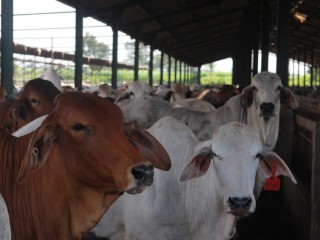 How Indonesia’s import quotas play out for the remainder of 2012 is becoming a key topic of interest as the third quarter allocation period from July 1 draws closer.
How Indonesia’s import quotas play out for the remainder of 2012 is becoming a key topic of interest as the third quarter allocation period from July 1 draws closer.
With 185,000 head of this year’s total 283,000 head quota already gone, just 98,000 head remains for the entire second half of the year.
By comparison, Australia exported almost twice that volume – 192,731 head – to Indonesia in the second half of 2011.
Australia’s northern cattle trade is desperately hoping the 98,000 head permit will increase as the year progresses, but there are few signs to suggest that is expected.
As most Indonesians will tell you, their country is a land of surprises, and no one really knows what will happen until the Minister for Trade makes his final announcement, whenever that is.
That just leaves speculation, but at least that tends to have narrowed into a couple of likely scenarios.
The first is that the Government will release either all or most of the 98,000 head quota for the second half of the year in one allocation, which would be logistically favourable for exporters and importers.
There is also talk that the Government will announce third quarter permits by mid-June, two weeks in advance of the quarter starting, but again these assurances have been made in the past and exporters have still found themselves none the wiser on allocations two weeks after the quarter period has officially started.
The second surrounds what impact a looming shortage of beef is likely to have in the market.
Warnings have grown increasingly louder in recent months that Indonesia is facing a serious beef shortage during the Eid-ul-Fitr holiday period in mid-August as a direct result of the Government’s import cutbacks.
The Eid is a Muslim holiday that marks the end of Ramadan, the Islamic holy month of fasting. ‘Fitr’ means ‘breaking the fast’ and is a period when all Indonesian Muslims consume beef as a tradition. Demand for beef typically rises two to three times higher than normal levels across the entire country.
A shortage of beef has already forced beef prices higher in Indonesia this year. This is a low season for beef demand, however prices are currently as high as they were due the high season for demand during last year’s Eid-ul-Fitr.
Until now, a source explained to Beef Central last week, the availability of offal in the market from local and imported cattle – (imports of boxed offal items have also been severely restricted) – has partly helped to offset the shortage of beef and prevented beef prices from rising to such heights that would cause major alarm for the Indonesian Government.
Offal has helped to fill the gap in protein supply left by cuts to boxed beef imports and live cattle imports, rising in price in the process from 2900 rupiah to 5100 rupiah per kilogram.
However, as the Muslim holy period approaches and demand for beef spikes, prices for beef are likely to jump to unaffordably high levels, importers have warned.
“It is a time bomb for the Ramadan,” is how one Indonesian source described the situation to Beef Central last week.
If the beef shortage triggers a consumer backlash, the Government will be under pressure to increase import allocations to ease the supply situation.
Lot feeders say the Indonesian Government has long expressed a preference for live cattle imports over boxed beef imports, due to the multiplier effect that live cattle imports have by generating local employment for Indonesian feedlots and abattoirs.
However, they know that boxed beef imports would provide a more immediate solution for the Government if it is forced to turn to imports to relieve a sudden supply crisis.
“The Government has said to us so many times that if they have to increase then they will do it only for cattle, not for beef,” one Indonesian feedlot industry source said.
“When the prices are high the Government will try to stabilise the price, the faster way is to import boxed beef, that is what the feedlot industry fears.”



HAVE YOUR SAY